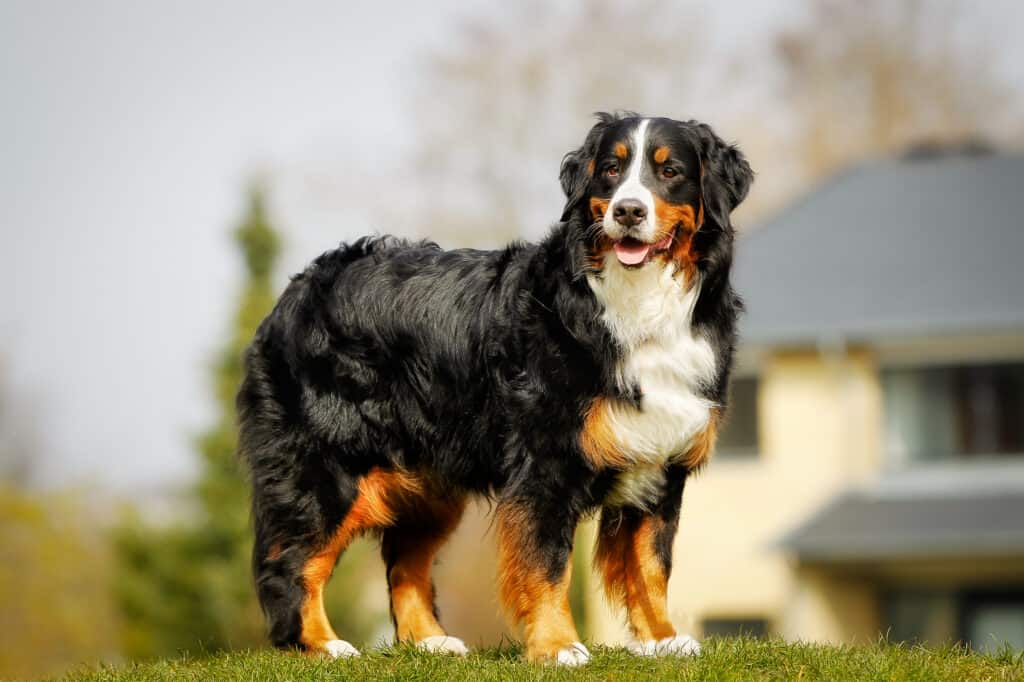Our website is supported by our users. We sometimes earn money when you click an affiliate link and make a purchase. This is at no extra cost to you and helps us to create quality content. Thank you for your support. For all that have shown us such wonderful support, we thank you from the bottom of our hearts!
The Bernese Mountain Dog is a striking, large dog known for its lush tricolored coat and a gentle, friendly demeanor.
Originating in the farmlands of Switzerland, these dogs were bred for their strength and versatility, historically having served as farmhands that could herd cattle, pull carts, and act as loyal companions.
Their roots trace back to the Roman mastiffs, developing what we recognize today as a breed tailored for hard work in harsh conditions, yet with an affectionate nature that makes them a beloved pet for families.

Recognized by their distinctive black, white, and rust-colored markings, Bernese Mountain Dogs are built to withstand cold climates, thanks to a thick, weather-resistant coat.
This intelligent breed is also well-known for their endurance and good nature, making them suitable for various canine activities and an ideal companion for outdoor adventures.
Training these dogs can be a rewarding experience due to their eagerness to please and natural obedience, but it’s important to start from a young age due to their size and energy levels.
Like all breeds, they have specific health concerns that potential owners should be aware of, with an average lifespan of around 7 to 10 years, and they require regular grooming to keep their coat in good condition.
Owning a Bernese Mountain Dog is a long-term commitment that involves understanding their exercise needs, space requirements, and a dedication to maintaining their health and happiness.
They fit well into active families that can provide them with love, jobs to do, and the companionship they thrive on.
Key Takeaways
- The Bernese Mountain Dog is a hardworking and friendly breed with Swiss origins.
- They have a distinct tricolored coat, require regular grooming, and are suited to cooler climates.
- These dogs need early training, enjoy family life and outdoor activities, and have specific health considerations.
History of the Bernese Mountain Dog
Your journey into the origin of the Bernese Mountain Dog, or Berner Sennenhund as they’re originally known, takes you back to the rural landscapes of Switzerland.
Developed in the Canton of Bern, these dogs were bred as working dogs with a significant role on farms.
Cattle herding and protection were among their primary duties, leveraging their size and strength to manage and guide livestock.
As part of the Sennenhund group, which includes four breeds of Alpine herders and guardians, their lineage is steeped in a history of utility and companionship.
The Berner’s journey to the United States is marked by a notable event in 1926, when a Kansas farmer initiated efforts to gain recognition for the breed by importing them, culminating in their official recognition by the American Kennel Club (AKC).
In Switzerland, a pivotal year in the Bernese Mountain Dog’s history was 1912, a time when breed standards became officially established, ensuring the preservation of their heritage as dependable farmhands and loyal protectors.
Today, while their roles have diversified, the Bernese Mountain Dog’s history remains a testament to their multifaceted abilities and enduring spirit.
Your appreciation for their past enhances your understanding of the breed’s role and significance in your life.
Physical Characteristics of the Bernese Mountain Dog
Your understanding of the Bernese Mountain Dog’s physical characteristics is important in appreciating this large breed’s presence and strength.
They are sturdy dogs with a thick coat, known for their considerable size and tricolored fur.
Height
- Males: typically 25 to 27.5 inches tall at the shoulder
- Females: slightly shorter, with a height of 23 to 26 inches
Weight
- Males: generally weigh between 80 to 115 pounds
- Females: tend to be lighter, weighing in at about 70 to 95 pounds
Eye Colors
- Commonly have dark brown eyes that express an intelligent and gentle demeanor
Coat Colors
- Distinctively tricolored with jet black as the primary color
- Markings in rust and clear white, particularly on the chest and face
Coat Types
- Possess a thick, medium-length double coat
- The outer coat is straight or slightly wavy; undercoat is woolly and dense
Life Expectancy
- Typically range from 7 to 10 years
Overview of the Bernese Mountain Dog’s Physical Characteristics
- Notable for their thick, silky coat that requires regular grooming
- Their size and coat make them well-suited for colder climates and outdoor activities
- The white markings contrasting against the black and rust colored fur give them a striking appearance
- A solid build contributes to their strength and capabilities as a working dog
Temperament and Training of the Bernese Mountain Dog
When you bring a Bernese Mountain Dog into your home, you’re adopting a pet with a distinctly good-natured personality.
Renowned for their patient and calm demeanor, this gentle dog is compatible with family life and blend well with small children and other pets.
Their friendly nature and comfort with strangers make them spectacular companions.
Obedience training should start early, as Bernese Mountain Dogs are eager to please and respond well to positive reinforcement.
Their intelligence makes them excel in various tasks and they thrive when given a job to do, reflecting their working heritage.
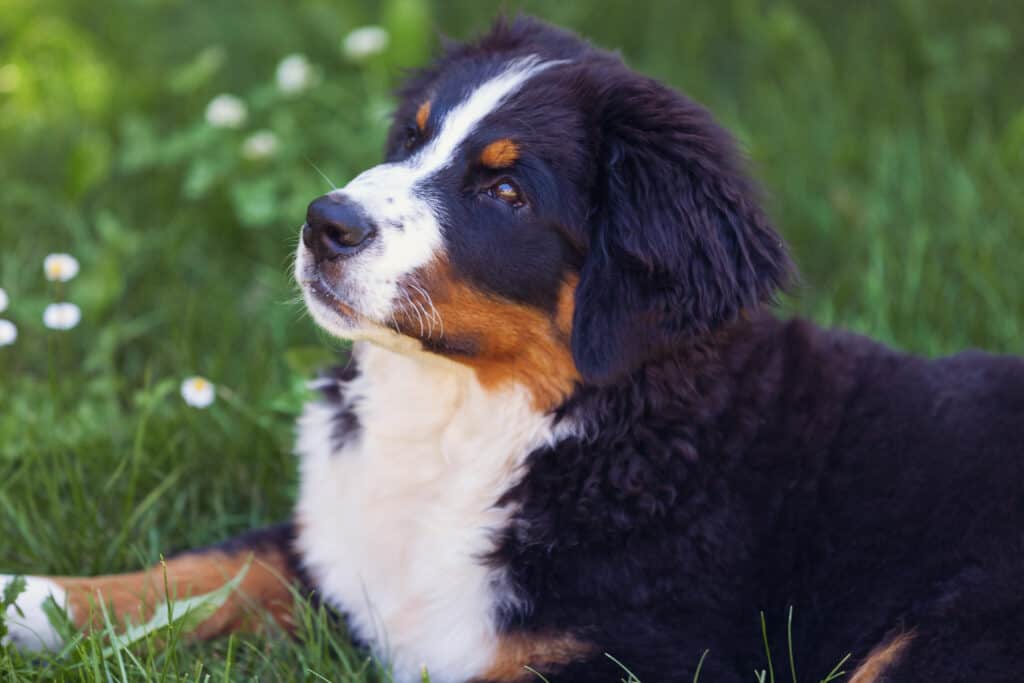
Key Temperament Traits:
- Gentle: Ideal around kids and other animals.
- Playful: They retain a puppy-like demeanor even as adults.
- Affectionate: Quick to form strong bonds with their owner.
Training Essentials:
- Early Socialization: Exposing your Bernese Mountain Dog to different situations ensures a well-rounded pet.
- Consistency: Stick to regular training schedules for best results.
- Positive Techniques: Reward-based methods foster a love for learning.
Remember, proper socialization and consistent obedience training from a young age forge a trustworthy pet.
While Bernese Mountain Dogs are usually eager to please, they can also be sensitive. Avoid harsh corrections, which could retract from their learning experiences.
As an owner, your approach should be both gentle and firm, guiding them with clarity and confidence.
With the right balance of training and affection, your Bernese Mountain Dog will be a loyal, intelligent, and loving companion for life.
Health Issues of the Bernese Mountain Dog
Bernese Mountain Dogs are known for their gentle temperament and striking appearance, but like all breeds, they are prone to certain health problems.
As a Bernese owner, it’s important to be aware of these potential problems to maintain your dog’s health and well-being.
Cancer
Cancer is a significant health concern in Bernese Mountain Dogs, and they are particularly predisposed to certain types of cancer.
This breed is known for its susceptibility to cancers such as histiocytic sarcoma, a malignant tumor originating from immune cells.
Other common cancers in Bernese Mountain Dogs include mast cell tumors and osteosarcoma.
Due to their large size, these dogs may also be prone to musculoskeletal issues that can increase the risk of certain cancers.
Early detection is crucial, and Bernese Mountain Dog owners should be vigilant for signs such as lumps, changes in appetite, or lethargy.
Regular veterinary check-ups and prompt attention to any concerning symptoms are essential for diagnosing and managing cancer in Bernese Mountain Dogs effectively.
Bloat or Gastric Dilatation-Volvulus (GDV)
Bloat, or Gastric Dilatation-Volvulus (GDV), is a serious and potentially life-threatening condition that can affect Bernese Mountain Dogs, particularly due to their deep chests.
This condition occurs when the stomach fills with gas and twists, leading to a blockage of blood flow.
Bernese Mountain Dogs may be more prone to GDV due to their large size and anatomy.
Symptoms include restlessness, unsuccessful attempts to vomit, a distended abdomen, and signs of distress.
Immediate veterinary attention is crucial for diagnosis and treatment, which may involve decompressing the stomach and stabilizing the dog.
Preventive measures such as feeding smaller, more frequent meals and avoiding vigorous exercise after eating can help reduce the risk of GDV in Bernese Mountain Dogs.
Regular veterinary check-ups and awareness of the breed’s susceptibility to this condition are vital for early detection and intervention.
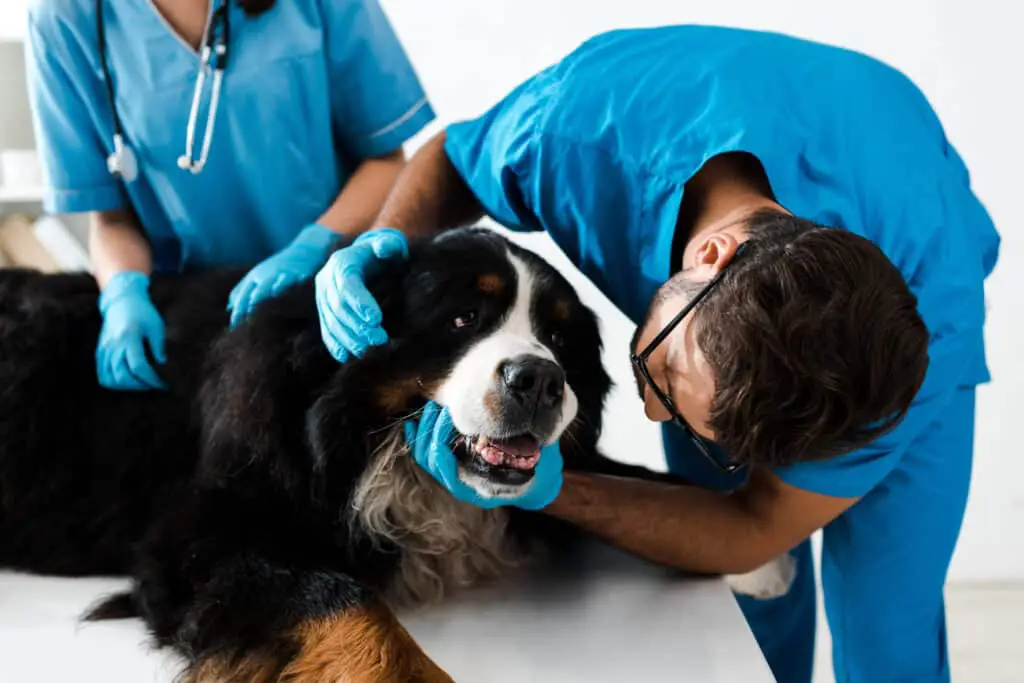
Hip and Elbow Dysplasia
Hip and elbow dysplasia are common orthopedic concerns for Bernese Mountain Dogs.
These hereditary conditions involve abnormal development of the hip and elbow joints, leading to instability, pain, and reduced mobility.
Bernese Mountain Dogs, being a large and heavy breed, are predisposed to these issues.
Hip dysplasia occurs when the hip joint doesn’t fit properly into the hip socket, while elbow dysplasia involves malformation of the elbow joint.
Symptoms may include lameness, difficulty rising, and reluctance to engage in physical activity.
Responsible breeding practices, including screening for dysplasia in breeding dogs, can help mitigate the prevalence of these conditions.
Management strategies often include weight control, exercise moderation, and, in severe cases, surgical intervention to improve the dog’s quality of life.
Regular veterinary check-ups and early detection are essential for effective management of hip and elbow dysplasia in Bernese Mountain Dogs.
Progressive Retinal Atrophy (PRA)
Progressive Retinal Atrophy (PRA) is a hereditary eye disorder that can affect Bernese Mountain Dogs, causing a gradual degeneration of the retina and eventual vision loss.
PRA in Bernese Mountain Dogs typically manifests as night blindness, leading to increased difficulty navigating in low-light conditions.
This genetic condition has no cure, making early detection crucial for managing the impact on a dog’s quality of life.
While there is no specific treatment for PRA, responsible breeding practices, including genetic testing, play a crucial role in reducing the prevalence of this condition within the Bernese Mountain Dog population.
Regular veterinary eye examinations and proactive monitoring by owners for any signs of vision impairment are essential for maintaining the overall well-being of Bernese Mountain Dogs affected by Progressive Retinal Atrophy.
Due to these health concerns, the lifespan of a Bernese Mountain Dog is typically shorter than that of smaller breeds, often ranging from 6 to 8 years.
Regular veterinary check-ups, a well-balanced diet, and an appropriate exercise regime can help manage these health issues and contribute to a quality life for your beloved companion.
Your awareness and proactive care are crucial to address and possibly prevent certain diseases, ensuring that your Bernese lives as long and as healthily as possible.
Grooming Your Bernese Mountain Dog
Grooming your Bernese Mountain Dog is essential for maintaining their thick beautiful coat.
Regular grooming keeps their thick coat in good condition, prevents tangles, and controls shedding.
Brushing
Your Bernese Mountain Dog’s double coat requires daily brushing.
At least three times a week, use a slicker brush to remove loose fur and prevent matting.
During shedding seasons, spring and fall, you’ll need to brush daily to manage the increased shedding.
Bathing
Bathe your dog every few months or as needed.
Use a shampoo formulated for dogs with a thick coat to keep their fur clean without stripping natural oils.
This massager really gets the soap down through your Bernese Mountain dog’s thick fur to it’s skin.
Ensure you rinse thoroughly to avoid residue that can create tangles and irritate the skin.
Cutting Fur/Hair
Trimming is generally minimal with Bernese Mountain Dogs.
Focus on areas prone to matting, such as behind the ears and beneath the legs.
Use blunt-tipped scissors to carefully cut large mats that are beyond brushing out.
Clipping or Grinding Nails
Keep your dog’s nails at a comfortable length to prevent overgrowth and splitting.
Use a nail clipper or grinder appropriate for large breeds and trim every few weeks.
If you accidentally cut the quick, dip their nails in Styptic Powder.
Also, you can check out our article on How to Grind Your Dog’s Nails or How to Clip Your Dog’s Nails Safely.
Dental Care
Incorporate dental care into your grooming routine to maintain oral health.
Brush your dog’s teeth several times a week with canine toothpaste and toothbrush to prevent tartar buildup and reduce the risk of gum disease.
Cleaning Ears
Regular ear cleaning is necessary, especially for dogs that drool.
Check and clean your dog’s ears weekly using a vet-recommended solution to prevent infections, remove debris, and catch any signs of irritation early.
We like these Pet MD – Dog Ear Cleaner Wipes – Otic Cleanser for Dogs.
Owning a Bernese Mountain Dog
When you make the decision to bring a Bernese Mountain Dog into your life, you’re committing to both a financial investment and a significant addition to your family.
You’ll navigate the initial costs, ongoing care, the possibility of adoption, and the importance of finding trustworthy breeders.
Cost of Purchase
Purchasing a Bernese Mountain Dog puppy from a reputable breeder can be costly.
Prices typically range from $800 to $2,000, but they can be higher depending on the breeder’s reputation and the dog’s lineage.
When selecting a breeder, consider ones that are recognized by breed clubs, signaling that they adhere to ethical breeding practices.
Maintenance Costs
Owning a Bernese Mountain Dog means planning for recurring maintenance costs.
This includes high-quality dog food, routine veterinary care, pet insurance, and grooming expenses. You should expect to spend:
- Dog Food: Approximately $50-$80 monthly
- Routine Vet Visits: Varies, but set aside $200-$400 annually
- Grooming: About $70 per session (bath, nail trim, ear cleaning)
Adopting a Bernese Mountain Dog
Adopting a Bernese Mountain Dog can be a more affordable option and provides a home to a dog in need.
Adoption fees are generally lower than purchasing from a breeder, ranging from $100 to $500.
You can give a second chance to a deserving dog through rescue organizations or shelters.
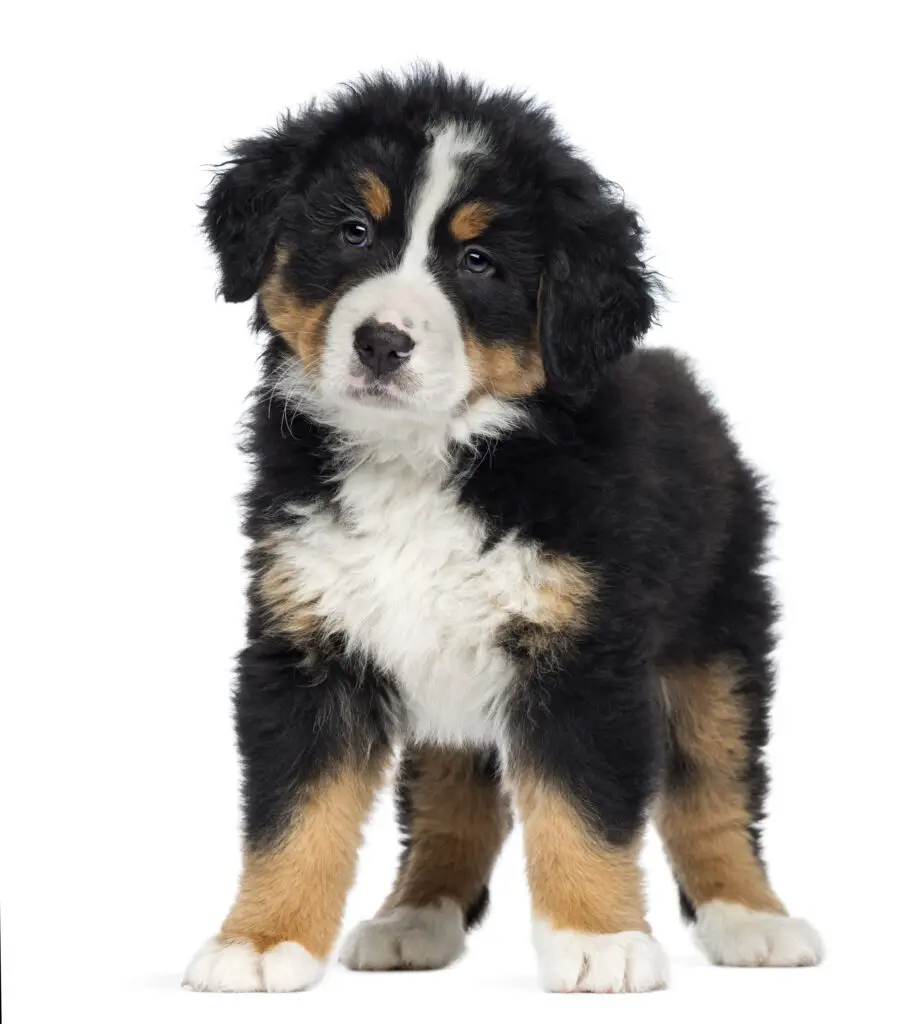
Finding Reputable Breeders
It’s imperative to find breeders who are not only responsible but have a transparent and ethical breeding program.
A reputable breeder should provide health clearances and a history of the puppies’ parents.
Engage with breeders through a breed club or community to ensure that you’re supporting ethical breeding practices and getting a healthy puppy.
Frequently Asked Questions
When considering a Bernese Mountain Dog as a new family member, you likely have questions about their characteristics, behaviors, and care requirements.
This section aims to answer some of the most common inquiries.
What are the typical characteristics of a Bernese Mountain Dog?
Bernese Mountain Dogs are known for their striking tri-colored appearance and sturdy physique.
They possess a friendly nature that coupled with their agility and strength makes them both good workers and companions.
How does the Bernese Mountain Dog’s temperament suit a family environment?
The Bernese Mountain Dog’s calm and affectionate demeanor makes them well-suited for family life.
They are gentle giants who thrive on being part of household activities and are known to be good with children and other pets.
What is the average height and weight range for a Bernese Mountain Dog?
A Bernese Mountain Dog typically measures 23 to 27.5 inches tall at the shoulders and weighs between 70 and 115 pounds.
Their size can be imposing, but it is paired with an endearing, affectionate nature.
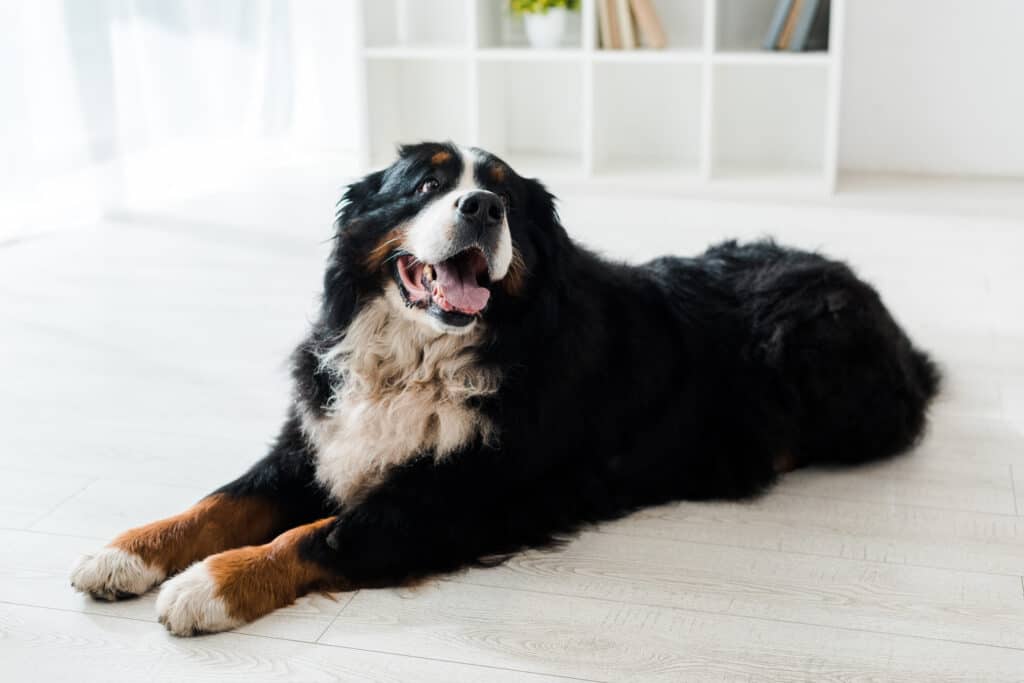
What level of shedding should be expected from a Bernese Mountain Dog?
Bernese Mountain Dogs have a thick, long coat that requires regular grooming.
They are moderate to heavy shedders, especially during seasonal changes, so expect to find hair around your home and on your clothes.
How much exercise does a Bernese Mountain Dog need?
Despite their size, Bernese Mountain Dogs don’t require excessive exercise but do need regular physical activity to stay healthy.
A couple of walks per day plus some playtime in the yard usually suffice.
What factors should be considered before adopting a Bernese Mountain Dog?
It’s important to consider their size, shedding, and exercise needs, as well as their potential health issues.
A Bernese Mountain Dog may be the right fit if you have ample space, time for grooming, and enjoy active companionship.
The Bottom Line on the Bernese Mountain Dog

When considering a Bernese Mountain Dog as your potential pet, you’re looking at an affectionate breed known for its loyalty to family.
Their gentle nature makes them excellent companions, and they tend to form strong bonds with their owners, thriving on attention and interaction.
These large dogs demand ample space to accommodate their size, and they benefit greatly from regular exercise to maintain a healthy weight and temperament.
Given their origins as farm dogs, Berners possess a blend of strength and agility, which is balanced with a characteristic calmness.
As your furry family member, the Bernese Mountain Dog has a well-earned reputation for being good with children.
They can be protective, which, coupled with their size, allows them to be effective watchdogs.
However, they are not typically aggressive, serving more as a guardian through presence rather than force.
In terms of grooming, be prepared for their thick, silky coat that requires regular care to prevent matting and to manage shedding.
Healthwise, proactive vet care is crucial as the breed can be susceptible to specific health issues, so you should be ready for that commitment.
Your Bernese Mountain Dog will need your dedication and love, but in return, you’ll gain a devoted and endearing member of your household.
Please read our Legal Disclaimer

